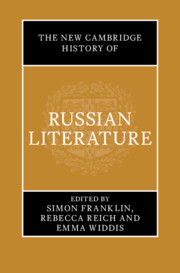Book contents
- The New Cambridge History of Russian Literature
- The New Cambridge History of Russian Literature
- Copyright page
- Contents
- Figures
- Contributors
- Acknowledgements
- On Transliteration, Names, and Dates
- Introduction
- History 1 Movements
- History 2 Mechanisms
- 2.1 The Monastery
- 2.2 The Court
- 2.3 The Salon and the Circle
- 2.4 The Thick Journal
- 2.5 The Publisher
- 2.6 Queerness
- 2.7 The Censor
- 2.8 The Voice
- 2.9 The Self-Publisher
- 2.10 The Market
- 2.11 The Internet
- 2.12 Empire
- Boxes 3 Places
- Boxes 4 Narrative Voices
- History 3 Forms
- History 4 Heroes
- Index
- References
2.4 - The Thick Journal
from History 2 - Mechanisms
Published online by Cambridge University Press: 31 December 2024
- The New Cambridge History of Russian Literature
- The New Cambridge History of Russian Literature
- Copyright page
- Contents
- Figures
- Contributors
- Acknowledgements
- On Transliteration, Names, and Dates
- Introduction
- History 1 Movements
- History 2 Mechanisms
- 2.1 The Monastery
- 2.2 The Court
- 2.3 The Salon and the Circle
- 2.4 The Thick Journal
- 2.5 The Publisher
- 2.6 Queerness
- 2.7 The Censor
- 2.8 The Voice
- 2.9 The Self-Publisher
- 2.10 The Market
- 2.11 The Internet
- 2.12 Empire
- Boxes 3 Places
- Boxes 4 Narrative Voices
- History 3 Forms
- History 4 Heroes
- Index
- References
Summary
The Russian ‘thick journal’, from its inception in the early 1800s to the present day, is at once a cultural institution, an index of intellectual life, and an important publishing mechanism. During the nineteenth century, the temporal focus of this chapter, Russia’s low literacy rate, poorly developed distribution networks, and virtual absence of inexpensive editions of high-quality literature gave the monthly thick journal a central place in Russian culture. From the 1840s until the 1880s, the thick journals published every subsequently canonical Russian novel except for Nikolai Gogol’s Dead Souls, alongside works of criticism, history, philosophy, the natural sciences, and the social sciences, creating an expanding galaxy of discourses, many of which would migrate into the thematics and styles of the fictions they surrounded. That writers often began serialisation before completely drafting their novels made these fictions more open to such migration.
Keywords
- Type
- Chapter
- Information
- The New Cambridge History of Russian Literature , pp. 277 - 292Publisher: Cambridge University PressPrint publication year: 2024

